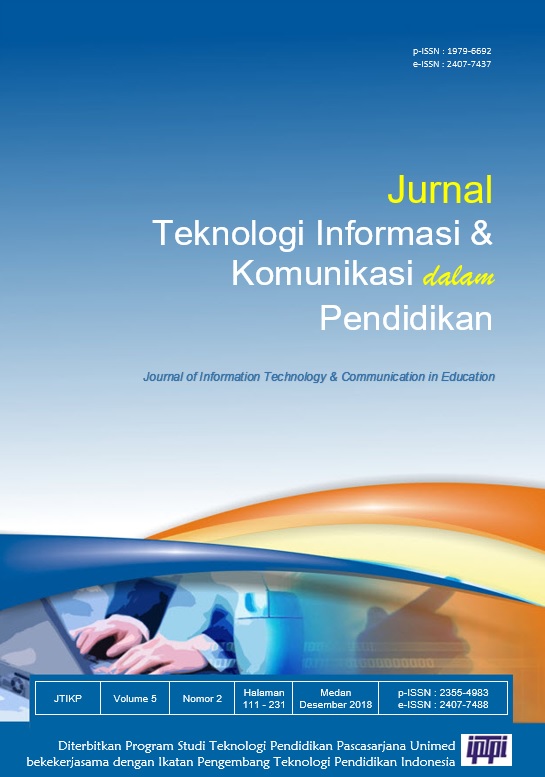PENGEMBANGAN E-MODUL PEMBELAJARAN EKONOMI SMA
DOI:
https://doi.org/10.24114/jtikp.v5i2.12592Abstract
Abstrak: Penelitian ini bertujuan untuk: (1) menghasilkan e-modul pembelajaran yang layak digunakan dalam pembelajaran dan dapat dipakai untuk pembelajaran individual, (2) untuk mengetahui keefektifan e-modul pembelajaran yang dikembangkan pada pembelajaran Ekonomi. Jenis penelitian pengembangan menggunakan model Borg dan Gall dengan model pengembangan pembelajaran Dick dan Carey. Hasil penelitian menunjukkan; (1) uji ahli materi pelajaran Ekonomi berada pada kualifikasi sangat baik (88,12%), (2) uji ahli desain pembelajaran berada pada kualifikasi sangat baik (83,5%), (3) uji ahli rekayasa perangkat lunak berada pada kualifikasi sangat baik (86,07%), (4) uji coba perorangan berada pada kualifikasi sangat baik (88,57%), uji coba kelompok kecil berada pada kualifikasi sangat baik (96,27%), uji coba lapangan berada pada kualifikasi sangat baik (98,46%). Produk akhir dari pengembangan e-modul pembelajaran ini dilanjutkan dengan uji keefektifan produk. Hasil pengujian hipotesis diperoleh t hitung = 4,25 pada taraf signifikansi α = 0,05 dengan dk 96 diperoleh t tabel = 1,67 sehingga t hitung > t tabel. Disimpulkan bahwa hasil belajar kelompok siswa yang dibelajarkan dengan menggunakan e-modul pembelajaran sebesar 84,83% lebih tinggi dari kelompok siswa yang dibelajarkan dengan menggunakan buku teks ekonomi sebesar 75,2%. Kata Kunci: e-modul pembelajaran, pembelajaran ekonomi Abstract: This study aims to: (1) produce learning e-modules that are suitable for use in learning and can be used for individual learning, (2) to determine the effectiveness of e-learning modules developed in economic learning. This type of development research uses the Borg and Gall models with the learning development model of Dick and Carey. The results of the study show; (1) Economic subject matter expert test is in very good qualification (88.12%), (2) learning design expert test is in very good qualification (83.5%), (3) test of software engineering expert is in qualification very good (86.07%), (4) individual trials were in very good qualifications (88.57%), small group trials were very good qualifications (96.27%), field trials were very qualified good (98.46%). The final product of the development of this learning e-module is continued by testing the effectiveness of the product. The results of hypothesis testing obtained t count = 4.25 at the significance level α = 0.05 with dk 96 obtained t table = 1.67 so that t count> t table. It was concluded that the group learning outcomes of students who were taught using the e-learning module were 84.83% higher than the group of students who were taught using economic textbooks of 75.2%. Keywords: e-module learning, economic learningDownloads
Published
28-02-2019
How to Cite
Dewi, A. S., Sitompul, H., & Napitupulu, E. (2019). PENGEMBANGAN E-MODUL PEMBELAJARAN EKONOMI SMA. JURNAL TEKNOLOGI INFORMASI & KOMUNIKASI DALAM PENDIDIKAN, 5(2), 111–125. https://doi.org/10.24114/jtikp.v5i2.12592
Issue
Section
Articles




